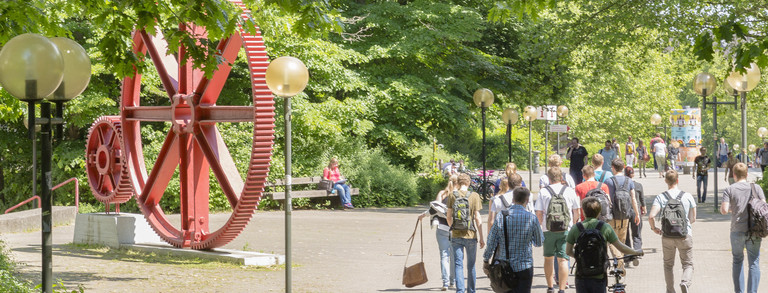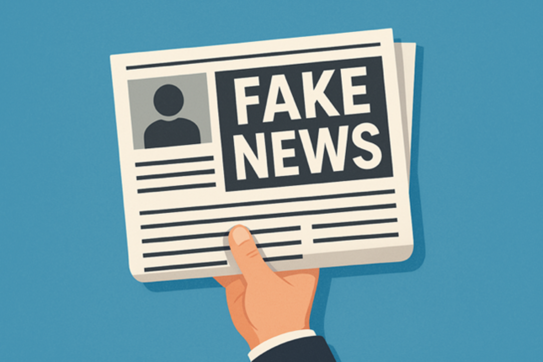Fake News
What is it about?
False or misleading information is often spread intentionally or unintentionally. When researching information and literature, as well as on social media, this false content is an important issue. On this page you will find a selection of information and resources - from definitions of terms to the exciting question of how to recognise and evaluate false news.
Concepts
Different terms for different forms of misinformation can overlap, and it is often not clear what exactly is meant by these terms. In recent years, the intention of dissemination has increasingly been used as the basis for the use of the term (see Cacciatore 2021).
A good overview of the terms fake news, misinformation and disinformation is provided by the Federal Agency for Civic Education (Hoffmann 2023).
Literature:
- Cacciatore, Michael A. (2021): Misinformation and Public Opinion of Science and Health: Approaches, Findings, and Future Directions. In: PNAS, Vol. 118, No. 15, e191243711 (Online) https://doi.org/10.1073/pnas.1912437117 (Abruf: 25.4.2025)
- Hoffmann, Christian Pieter (2023): Fake News, Misinformation, Desinformation. Bundeszentrale für Politische Bildung. In: Information zur politischen Bildung. H. 355: Medienkompetenz in einer digitalen Welt, S. 49-52 (Abruf: 25.04.2025)
- Presse- und Informationsamt der Bundesregierung: Was ist Desinformation (Online) https://www.bundesregierung.de/breg-de/aktuelles/was-ist-desinformation-1875148 (Abruf: 24.04.2025)
Recognising desinformation / Fake News
- Evaluating Resources: explains in an overview which sources are suitable (Berkeley Library, Univ. of California)
- Klicksafe: Information primarily for young people and educators, with interactive media for the self-test
- Qapito! - Quellen kritisch beurteilen: the project aims to improve young people's source evaluation skills. More information on the project in an interview
- Mediendoktor: The project of the Chair of Science Journalism at TU Dortmund University monitors and evaluates science journalistic reporting in the areas of health, nutrition and the environment
- Task Force ‘Conspiracy Theories’ of the German Society for Psychology (DGPs)
- Landesanstalt für Medien NRW: Pages of the state authority on the topic of ‘disinformation’ with lots of background information and an online test
- klimafakten.de deals specifically with disinformation on climate change and provides verified information
- Recognising Fake News: the most important rules for recognising fake news at a glance, poster from the International Federation of Library Associations and Institutions (IFLA)
Tool box
- CORRECTIV - Recherchen für die Gesellschaft - Fact checks by the non-profit organisation for investigative journalism, including ways to report fakes
- MIMIKAMA - Comprehensive fact checks by the association for education about internet abuse, including ways to report fakes
- ARD-Faktenfinder - concrete fact checks from ARD
- #Faktenfuchs - fact check editorial team of Bayerischer Rundfunk with information pages and concrete fact checks
- Faktencheck bei dpa - fact check editorial team of the German Press Agency
- German-Austrian Digital Media Observatory (GADMO): Association of fact-checking organisations with the aim of jointly combating disinformation and misinformation
- Whatsapp-Fact check of the German Press Agency (dpa): Sending a message or report via Whatsapp, which is then editorially checked for its truthfulness (fact check)
- Websites for Fact-Checking - Overview by the College of Staten Island (NY) of websites that deal with fact-checking, e.g. SciCheck (fact-checking for ‘scientific’ disinformation)
- Check photos for editing with Foto Forensics or
- with a reverse search via TinEye or Google Images
- Find identical content with Youtube DataViewer or
- Still images via reverse search (see Picture checkers above)
- Summary of Deep Fakes in 4 minutes (in german) (Bayerischer Rundfunk, as of 11.01.2020)
- Dangers and recognising deep fakes (in german) (Federal Agency for Civic Education (bpb), Tim Walter, 22.11.2023)
- Munzinger Personen: German-language biographical database on international public figures.
- Kürschners Deutscher Gelehrten-Kalender Online: Brief information on academics in German-speaking countries
- World Biographical Information System Online (WBIS Online): the world's most comprehensive database on the life and work of international personalities from the 16th century to the present day
- Online encyclopaedias and reference works via our Subject Guide General Reference and direct access to reference works reference works
- Internet Archive (webarchive with Wayback Machine)
- Federal Statistical Office - destatis portal (official data on society, economy, environment and government)
- Eurostat - Statistical Office of the European Union
Contact Publication Support

Questions?
- Our subject librarians are your contacts for all scientific questions
- If you have any questions about literature research and publication support, please contact Information Skills and Publication Support
- Our media educators and media didactics experts in the Hybrid Learning Center are happy to answer any questions you may have about media skills (e-mail)








